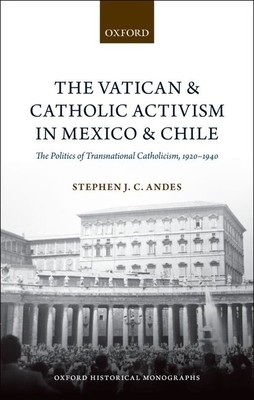
- We will send in 10–14 business days.
- Author: Stephen J C Andes
- Publisher: Oxford University Press, USA
- ISBN-10: 0199688486
- ISBN-13: 9780199688487
- Format: 14.5 x 21.6 x 2.5 cm, hardcover
- Language: English
- SAVE -10% with code: EXTRA
Reviews
Description
As in Europe, secular nation building in Latin America challenged the traditional authority of the Roman Catholic Church in the early twentieth century. In response, Catholic social and political movements sought to contest state-led secularisation and provide an answer to the 'social question', the complex set of problems associated with urbanisation, industrialisation, and poverty. As Catholics mobilised against the secular threat, they also struggled with each other to define the proper role of the Church in the public sphere. This study utilizes recently opened files at the Vatican pertaining to Mexico's post-revolutionary Church-state conflict known as the Cristero Rebellion (1926-1929). However, looking beyond Mexico's exceptional case, the work employs a transnational framework, enabling a better understanding of the supranational relationship between Latin American Catholic activists and the Vatican. To capture this world historical context, Andes compares Mexico to
Chile's own experience of religious conflict. Unlike past scholarship, which has focused almost exclusively on local conditions, Andes seeks to answer how diverse national visions of Catholicism responded to papal attempts to centralize its authority and universalize Church practices worldwide.
EXTRA 10 % discount with code: EXTRA
The promotion ends in 18d.04:37:25
The discount code is valid when purchasing from 10 €. Discounts do not stack.
- Author: Stephen J C Andes
- Publisher: Oxford University Press, USA
- ISBN-10: 0199688486
- ISBN-13: 9780199688487
- Format: 14.5 x 21.6 x 2.5 cm, hardcover
- Language: English English
As in Europe, secular nation building in Latin America challenged the traditional authority of the Roman Catholic Church in the early twentieth century. In response, Catholic social and political movements sought to contest state-led secularisation and provide an answer to the 'social question', the complex set of problems associated with urbanisation, industrialisation, and poverty. As Catholics mobilised against the secular threat, they also struggled with each other to define the proper role of the Church in the public sphere. This study utilizes recently opened files at the Vatican pertaining to Mexico's post-revolutionary Church-state conflict known as the Cristero Rebellion (1926-1929). However, looking beyond Mexico's exceptional case, the work employs a transnational framework, enabling a better understanding of the supranational relationship between Latin American Catholic activists and the Vatican. To capture this world historical context, Andes compares Mexico to
Chile's own experience of religious conflict. Unlike past scholarship, which has focused almost exclusively on local conditions, Andes seeks to answer how diverse national visions of Catholicism responded to papal attempts to centralize its authority and universalize Church practices worldwide.


Reviews